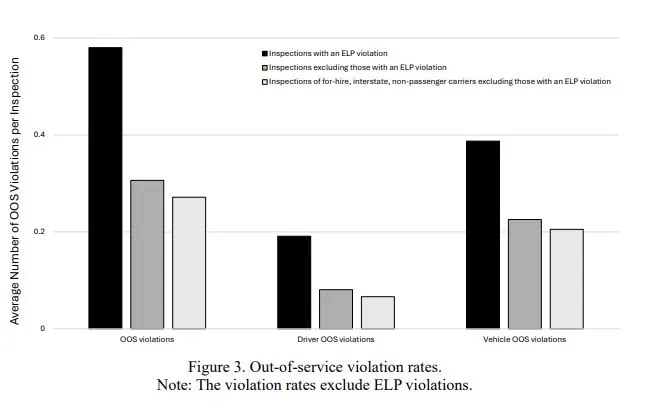A new study analyzed the relationship between traffic accidents and drivers who violate the English Language Proficiency (ELP) regulation.
A new study analyzed the relationship between traffic accidents and drivers who violate the English Language Proficiency (ELP) regulation, demonstrating that noncompliance with ELP requirements is associated with higher accident rates on U.S. highways.
The study, co-authored by Alex Scott, Associate Professor of Supply Chain Management at the University of Tennessee in Knoxville, highlights the need to assess whether truck drivers who violate ELP standards are indeed less safe than other drivers, as well as to examine the role of the transportation companies that employ them. The goal is to develop policies that help improve safety in the trucking industry.
Scott conducted the analysis using data from the Federal Motor Carrier Safety Administration (FMCSA) through its BASIC scoring system. The study period covered May 1 to September 21, 2025, using violation codes related to ELP compliance to identify accidents connected to this regulation. From this process, Scott identified several trends linking traffic accidents with noncompliance with the ELP rule.
Rising ELP violations: statistics and trends
Following the executive order issued by President Trump in April, data show a steady increase in the enforcement of ELP regulations during June and July. According to the analysis, the peak increase reached approximately 6,000 violations per month. With around 200,000 non-domiciled CDL holders, enforcement measures have become increasingly strict.
The study also found significant differences in ELP violation rates between individual states and federal data. At the federal level, violations were 3.5 times higher than those recorded in Wyoming, the state with the highest rate. The states with the highest ELP violation rates were Wyoming, Texas, and Arizona.
In addition to the number of violations, the analysis examined the safety ratings of carriers with ELP violations, which were on average lower than those of carriers without such violations.
The average FMCSA BASIC score in the Vehicle Maintenance category for carriers with ELP violations was 9.06, while in the Unsafe Driving category it was 6.23. The study noted that these elevated values indicate poor safety performance.
Furthermore, inspections involving ELP violations showed a higher number of additional violations compared to inspections without ELP infractions. Inspections with an ELP violation averaged 3.9 additional violations, compared to 1.69 violations for those without ELP issues, 2.3 to 1 ratio, according to the study. This gap widened when considering only interstate freight carriers. In addition, inspections with ELP violations also reported a greater number of Out-of-Service (OOS) violations compared to those without ELP infractions.
Finally, the study found that Hours of Service (HOS) noncompliance among carriers with ELP violations was higher than the average for all other drivers, both across all carriers and specifically among interstate freight carriers.
Conclusions: drivers or carriers?
Based on these data, the report concludes that there are two possible explanations for the correlation between ELP violations and highway accidents. The first relates to language proficiency: drivers with limited English skills are less likely to understand complex federal rules and regulations, which can lead to a lack of awareness regarding proper maintenance procedures and Hours of Service compliance.
The second explanation suggests that some trucking companies and their managers may choose to hire drivers with poor English proficiency because they accept lower wages than those with the proper linguistic and professional qualifications.
In either case, the study emphasizes the need for immediate action to address this issue and strengthen safety in the U.S. trucking industry.
Truck driver: stop choosing the worst route

The best roadside attractions for truckers in the U.S.
America’s highways hide unique places that break up the routine, don’t hesitate to check out these roadside attractions along the way. The road is much

The trucker style: comfort, function, and identity
Truckers’ style is much more than workwear; it’s an identity. These are the most commonly worn garments among truckers. Truckers’ style is much more than

Chaos on Highway 61: Viral Wrong-Way Truck Video Reignites the CDL Debate
An 80-ton tractor-trailer traveling miles in the wrong direction on Missouri’s Highway 61 has reignited a nationwide debate over Commercial Driver’s License (CDL) standards, training

How technology affects driver retention
Friend or foe? 52% of drivers say technology directly influences their decision to stay with or leave a fleet. Fleet telematics company Platform Science published

Dalilah Law seeks to remove non-english speaking commercial drivers
President Donald Trump proposed the “Dalilah Law,” an initiative aimed at prohibiting undocumented immigrants from obtaining commercial driver’s licenses. On February 24, President Donald Trump

FORMULA 1 and the AI That Could Transform Transportation in the U.S.
The artificial intelligence system that Formula 1 implemented to monitor every car on every turn is opening the door to new applications in trucking, logistics,


